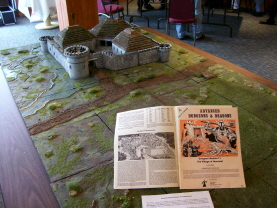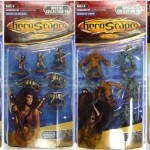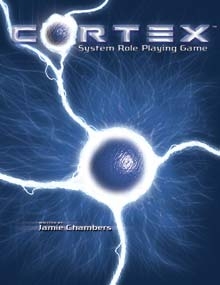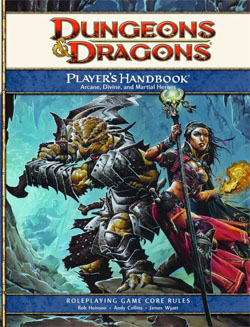Starblazer and Mindjammer
 One of the most promising new game systems I reviewed in Black Gate 14 was used for the pulp role-playing game Spirit of the Century from Evil Hat Productions. FATE is a streamlined set of rules based more on adjectives and descriptions than complicated and time consuming point allocations. Not only does the system make task resolution fast, it encourages players and game masters alike to storytell more than die roll.
One of the most promising new game systems I reviewed in Black Gate 14 was used for the pulp role-playing game Spirit of the Century from Evil Hat Productions. FATE is a streamlined set of rules based more on adjectives and descriptions than complicated and time consuming point allocations. Not only does the system make task resolution fast, it encourages players and game masters alike to storytell more than die roll.
I was unabashedly excited about Spirit of the Century and couldn’t help wondering how the mechanics designed for pulp 1930s role-play would work in another setting.
An English game company named Cubicle Seven must have been wondering the same thing, because they took up the system and retooled it for science fiction role-playing.
Starblazer Adventures is a beautiful, thick hardback of 629 pages, stuffed full of art taken from a popular British space opera comic from the 1970s and ’80s. Nearly every page is decorated with exciting action pics evocative of high octane adventure.
But more than 600 pages, I can see you asking, isn’t that… needlessly long? Is it crammed with charts that you must consult?
No. What it is crammed with is all the information that a game master could need to run a thrill-packed space campaign, and then some.


 One of the things I most enjoy about
One of the things I most enjoy about  There are a lot of things to commend this book to an experienced gamer. The rules are fairly simple yet cover a lot of ground. I like how the abilities are not really tied into specific stats that are sometimes hard to justify - this system is much more fluid. It also is not conducive to rules lawyering and if there is one thing I hate, it is rules-lawyering, so this is a positive for me. I can see where the OCD crowd who wants a rule for everything could be irritated with it, but I game by the principle that story precedes rules, and this rule set is made for that mindset.
There are a lot of things to commend this book to an experienced gamer. The rules are fairly simple yet cover a lot of ground. I like how the abilities are not really tied into specific stats that are sometimes hard to justify - this system is much more fluid. It also is not conducive to rules lawyering and if there is one thing I hate, it is rules-lawyering, so this is a positive for me. I can see where the OCD crowd who wants a rule for everything could be irritated with it, but I game by the principle that story precedes rules, and this rule set is made for that mindset. Risus: The Anything RPG
Risus: The Anything RPG
 If a single positive resulted from the work of that woefully misinformed but correctly acronymed organization BADD (Bothered about Dungeons & Dragons), a group that waged a crusade to stop children from jumping into the Bags of Holding that they learned to construct from an $11.99 hardcover rulebook purchased at a hobby store, it was the computer RPG
If a single positive resulted from the work of that woefully misinformed but correctly acronymed organization BADD (Bothered about Dungeons & Dragons), a group that waged a crusade to stop children from jumping into the Bags of Holding that they learned to construct from an $11.99 hardcover rulebook purchased at a hobby store, it was the computer RPG  Fourth Edition Dungeons and Dragons has been with us for about a year now; long enough for the gaming community to get a pretty good taste of it. I’ve been hearing various reports from gamer friends about the system, and opinions of it have fallen across a roughly tripartite spectrum, from favorable to neutral to negative. Among these views, though, there is agreement that this isn’t the same old Dungeons and Dragons. Fans of Fourth Edition sometimes call it a “transformation,” or point out, “This time around they didn’t have any sacred cows. They were ready to change anything.” Critics have generally agreed that “It might be a game some people like, but it’s no longer D&D.”
Fourth Edition Dungeons and Dragons has been with us for about a year now; long enough for the gaming community to get a pretty good taste of it. I’ve been hearing various reports from gamer friends about the system, and opinions of it have fallen across a roughly tripartite spectrum, from favorable to neutral to negative. Among these views, though, there is agreement that this isn’t the same old Dungeons and Dragons. Fans of Fourth Edition sometimes call it a “transformation,” or point out, “This time around they didn’t have any sacred cows. They were ready to change anything.” Critics have generally agreed that “It might be a game some people like, but it’s no longer D&D.”